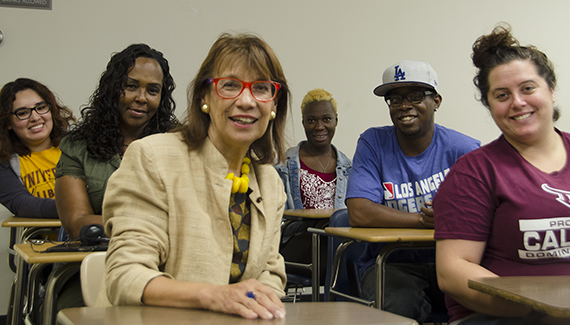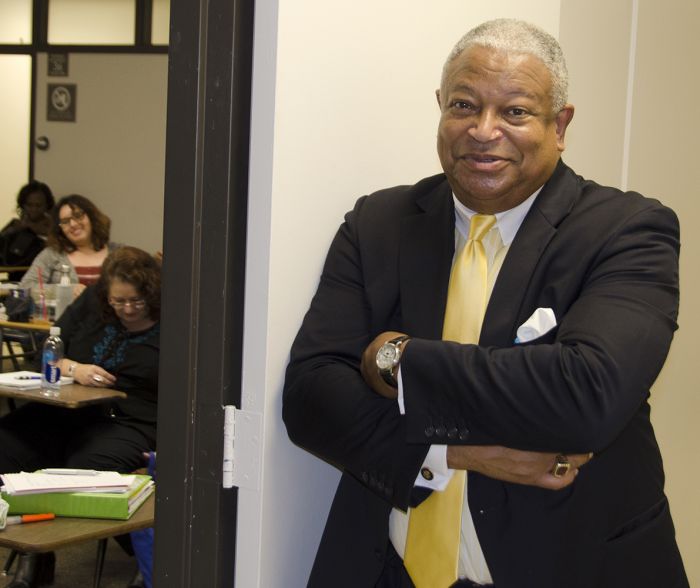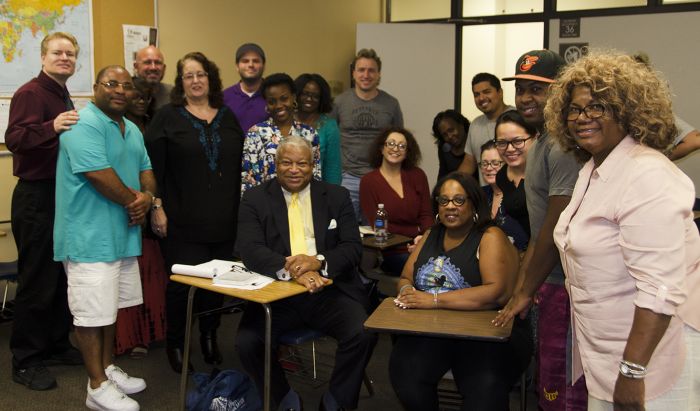
J. Steven Rhodes, former U.S. ambassador to Zimbabwe, and Katherine Clerides, daughter of the late President Glafcos Clerides of Cyprus, were on campus last month as visiting scholars in the Negotiation, Conflict Resolution and Peacebuilding (NCRP) program.
The leaders spent one to four days on campus, meeting with faculty and lecturing in NCRP classes.
“NCRP speakers bring a vast wealth of experience that they share with our students,” said professor and NCRP Director Brian Jarrett. “They share the lessons that they often had to learn the hard way, and students can benefit from these experiences so when they are in practice out in the world, they are ready for such situations, ethical dilemmas, and roadblocks.”
…students can benefit from these experiences so when they are in practice out in the world, they are ready for such situations, ethical dilemmas, and roadblocks.
Clerides, who visited CSUDH as a recipient of the 2016 Weinstein JAMS International Fellowship, is a lawyer who currently serves as president of the board of directors of the political think tank the Glafcos Clerides Institute. As part of her fellowship, Clerides is focusing on the “concepts of forgiveness and dignity in the mediation of political conflicts to address long-standing interethnic disputes in Cyprus.” She is following her father’s footsteps, who as president of Cyprus was celebrated for his efforts to reach a settlement and peace between Cyprus’ Greek and Turkish Cypriot communities.

Rhodes, who was appointed ambassador to Zimbabwe by President George H.W. Bush in 1989, discussed his work and relationship with Zimbabwe President Robert Mugabe, who still holds the office today. He began his take by covering a wide variety of topics–from early United States history, such as the Connecticut Compromise, and George Washington at the Constitutional Convention in 1787, to the functions and issues related to regulatory agencies.
Throughout his remarks, Rhodes sprinkled in tips and advice related to conflict resolution and negotiation.
“For every issue there are a bunch of concerns, so you need to get the leaders on each side to tell you what their three most important issues are, then go back and strategize about what you will propose in relation to those items,” said Rhodes while sharing a “common marketing technique” used in negotiations. “Why does that work? Because if you can get down to just a few of the most important things, then get the person two out of the three things, that person will be happy. Everyone knows that they can’t get everything they want. It’s about getting the priorities down to a workable number on both sides.”
Rhodes and Clerides were on campus as part of a visiting scholars series that Jarrett has organized for the NCRP program this academic year. Professor Zhiqun Zhong of Jinlin Police College is currently conducting research and working with faculty and students in NCRP on understanding how police enforcement, corrections, and restorative measures are implemented in China and how these processes differs from such processes in the United States. In spring 2017, well-known environmental meditator Peter Adler will also join NCRP and teach a class on environmental meditation.
Jarrett believes lessons gained through personal experiences are among the most valuable.
“It is important for students to listen carefully to the stories, case examples, and in particular experiences of each presenter as they bring the hands-on knowledge to the classroom,” said Jarrett. “I think the most valuable message that our speakers bring is the importance of developing one’s own autonomy and sense of personal accountability to make positive changes in one’s life, the community, and the society at large.”
